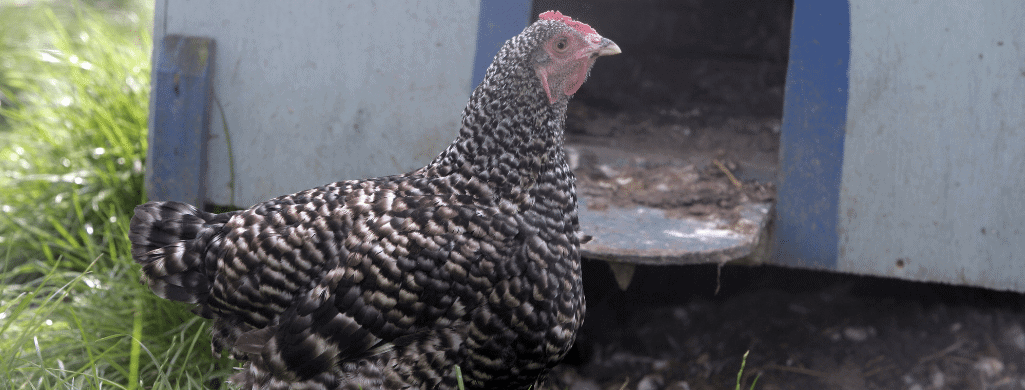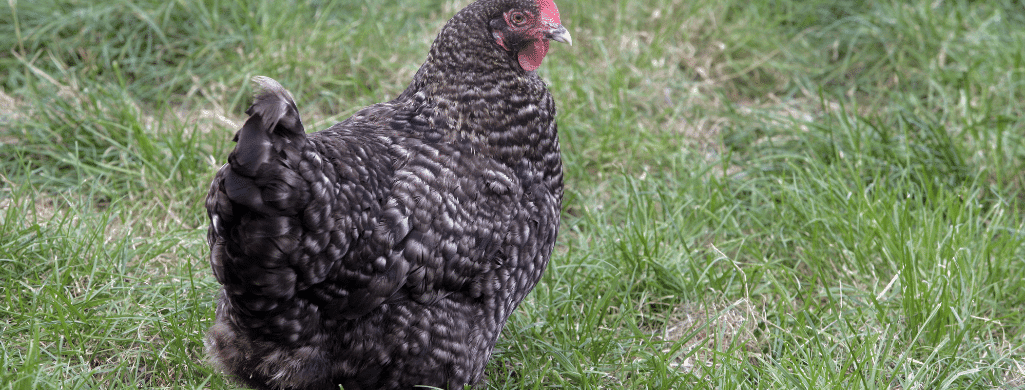Different breeds of chickens come with different characteristics backyard chicken keepers need to know about.
It’s easier to prepare for something like a broody chicken if you anticipate it.
Do Maran chickens go broody, though?
Cuckoo Marans and French Marans are an infrequently broody breed of chicken. Chicken owners may occasionally find broody chickens among this breed, but it isn’t as prevalent as other breeds. Still, they’re considered good layers, setters, and, once their chicks arrive, good mothers as well.
Varying chicken breeds offer differing levels of broodiness.
Keep reading, and we’ll cover what you need to know if you’re interested in chicken keeping with a Maran chicken.

Table of Contents
ToggleAt What Age Do Marans Start Laying?
Brooding goes hand-in-hand with egg laying. This is when broody behaviors would start to pose a risk.
Maran chickens start laying later than most chickens. Many breeds begin to lay when they’re four to six months old.
For Maran chickens, the average age is usually between eight and nine months old.
Once the laying starts in your chicken coop, These types of hens lay about 150 to 200 eggs annually.
Further Reading: Maran Chicken Egg: The Ultimate Guide
This puts them in a range good enough to make them dual-purpose birds. This means they’re kept for both egg production and as meat birds.
Are Marans Good Brooders?
Broodiness isn’t as common in Maran chickens as in breeds like Sussex, Silkie, Bantams, or Brahma chickens.
Yet, they’re still good brooders with a mothering instinct when given a chance to have chicks.
Ideally, this broodiness sets in when you’re looking for your hens to hatch baby chicks.
Otherwise, it can prove a problem for backyard chicken keepers. Luckily, there are ways to break this broodiness if it persists.
Further Reading: Characteristics of Maran Chickens

How Do You Know If a Hen is Broody?
If you’re a brand-new chicken keeper, you may not know what to watch out for when a hen goes broody. While it isn’t an exact science, here are a few clear signs to tell you what’s happening.
Your Chicken Won’t Leave the Nest
One of the first signs a hen has gone broody is an unwillingness to leave her nesting box behind.
After all, if she’s waiting for a batch of chicks – even if she isn’t hatching eggs – she won’t want to leave them unattended and unarmed in her nest box.
Marans are usually pretty active, so if they’re not jumping and flying around, you know something’s up.
Further Reading: Maran chickens can fly?
Your Chicken Has Become More Aggressive with You
Another sign is if these usually adaptable birds take on defensive behaviors. For example, a broody hen may puff out her feathers to look bigger than she is.
Other defensive behaviors may include growling or even pecking at you if you attempt to access the nest. If you do manage to pull her away, you’ll likely see her fighting to get back almost immediately.
Your Chicken is Plucking Her Feathers
There are some behaviors backyard chicken owners get worried about during brooding.
When many chickens start to brood, it isn’t uncommon to see them tugging at their own feathers.
Most commonly, they’ll pull their breast feathers out. So, keep an eye out for any harmful plucking of the chest feathers.

Your Chicken Has Become More Aggressive with Other Chickens
It isn’t just you. A broody chicken may take up new, aggressive behaviors.
Even a formerly passive bird may become more aggressive with her friendly flockmates.
This one can vary on a bird-by-bird basis. There are times broody hens have no problem sharing a coop.
Yet, every case is a little different. Whereas one hen might act kindly to the rest of the chicken population, others may see other birds as a threat.
Especially if they come too close to the nest, the hen may peck or get aggressive with them too.
How Do You Stop a Broody Hen?
There are also several ways to stop a broody spell in a chicken.
It’s possible to let a broody spell run its course or to work against instinct and break your broody chicken’s behavior.
Let Her Hatch Some Eggs
If you want baby chicks or have a way to handle them, one choice is to just let your chicken hatch some eggs. This is what she’s attempting to do when she’s brooding, so one option is to let nature run its course.
Yet, not every egg your chicken lays will hatch into a chick. The eggs need fertilizing for this to happen.
If you don’t have breeding roosters, you may have to buy your hen fertilized eggs to sit on.
It’s more cost-efficient and easier than using an incubator, but you’ll want to talk to a vet or more experienced backyard flock owner who can help guide you through the process.
Remove Her from the Flock
Sometimes, breaking a broody chicken is possible by removing her from her nest and the flock.
Make sure she has everything she needs in her temporary enclosure, and your chicken should work through her broodiness in around three days.
This timeline can vary depending on the chicken, though.
Make the Nest Colder
Another way to break a broody spell is to cool the nest down. By placing an ice pack or something frozen in the nesting box, your hen is less likely to attempt to brood there.
Similarly, it’s an option to cool the bottom of your chicken in some cool, clean water. She’ll likely walk around to dry herself off than brood in her nest.
Wait It Out
If you have plenty of time and don’t rely on these animals as production birds, it’s possible to wait a broody period out.
After a while, your chicken will notice her eggs aren’t hatching.
The only problem is this can take up to three weeks to work while the other options offer some immediate solutions.
After those three weeks, she’ll notice the eggs she’s been brooding on aren’t hatching.
At this time, you’ll need to take special care. Remember, your chicken will be more aggressive and may need extra care.
If you’ve found a hen brooding outside the chicken coop, it’s best to devise something to ensure she’s safe while she broods. This is particularly crucial if your hen has nested somewhere unsafe such as out in the open.
Since broody hens only leave the nest when needed, ensure your bird has all her basic needs met, including providing access to water and food.
How useful was this post?
Click on a star to rate it!
We are sorry that this post was not useful for you!
Let us improve this post!
Tell us how we can improve this post?
